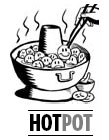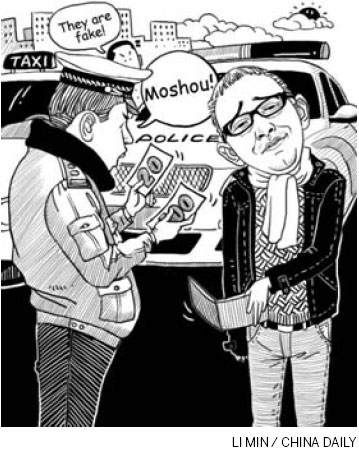Tough lesson in financial wisdom from a Beijing cop
By Erik Nilsson ( China Daily ) Updated: 2010-11-03 09:25:45"Do you know what moshou means?" the police officer asked me in Chinese.
"No," I said, thinking, "I sure hope it's not 'arrest'."
I whipped out my iPod touch and punched the pinyin spelling into translation software. "Confiscate" was the definition that came up.
While most people I know say they rarely encounter counterfeit currency, I seem to be a magnet for bogus banknotes.

A taxi driver had slipped me four fake 20s a few days before my law-enforcement incident. Not wanting to pawn off a forgery on the cabbie who had taken me to the office that day, I handed him a 100 and two 1s to cover the 22-yuan fare, apologizing for not having smaller change.
"What about those 20s?" the driver asked, pointing into my open wallet, which he had been scanning.
"They're fake," I told him, and let him have a look. This perhaps aroused his suspicion. He took the 100 and got on the phone. I heard him explaining the situation - that he had dropped off a foreign friend, whose currency seemed fishy - and reading the 100-yuan banknote's serial number.
To whom he was speaking, I had no clue.
"Don't get out," he told me.
"Look", I insisted, "the 20s are fake, but the 100 is real." I was sure the presence of the bum 20s had made him overly jittery about taking any of my cash.
Eventually, a police car pulled up, and we all piled out to settle the matter. Lo and behold, it turned out the 100 was phony, too.
I suddenly felt nervous, realizing I had another three counterfeit 100s and three more fake 50s in a separate pocket of my wallet.
These I have unintentionally accumulated over the years and had kept on my person as conversation pieces, mostly to see if friends can discern which bills are bunk when compared to actual cash. The same goes for the 20s, which are actually so poorly rendered that they are comical.
The idea behind the 20s - they were handed to me in the dark - I guess, is that nobody would expect them to be phony and wouldn't examine them as they would a 50 or 100.
It's like the only time I ever saw a bogus bill in the United States - a $1 note handed over by a drive-thru customer when I worked at McDonald's at age 16.
Of course, the cashier hadn't thought to look it over upon accepting it. I mean, who would fake a $1 bill? Upon discovering the buck was bogus, the restaurant manager called the FBI - a memory that caused consternation when I flashed back to it while talking to this cop in Beijing.
Were the police to moshou my wallet, the bundle of funny money folded in the side pocket would, indeed, look bad - as if I were involved in some underground counterfeiting ring.

The officer told me: "We're confiscating the bill. But we're not going to (insert verb I didn't understand here, which may have been "detain") you, because it would be troublesome for you and troublesome for us."
Whatever that verb was, I was happy the officers had opted against it.
The cop suggested only getting money from banks - my fake 100s had all been spit out of ATMs - and insisting tellers authenticate the currency.
One problem I have with distinguishing between ploys and real McCoys is that I'm red-green colorblind. (Perhaps the best way to determine a 50's or a 100's authenticity is tilting it to see if the numeral printed on the bottom corner changes between green and red.)
After dispensing their friendly advice, the police left, and the cabbie, to whom I later gave a real 100, drove off before I could apologize for inconveniencing him.
I walked to work 100 (fake) yuan poorer but richer in terms of what could, in a sense, be called financial wisdom.
Perhaps that's just the price I must pay for such pound-foolishness about funny money.
|
|
|
|
|
|
|
|


























 Raymond Zhou:
Raymond Zhou: Pauline D Loh:
Pauline D Loh: Hot Pot
Hot Pot Eco China
Eco China China Dream
China Dream China Face
China Face






